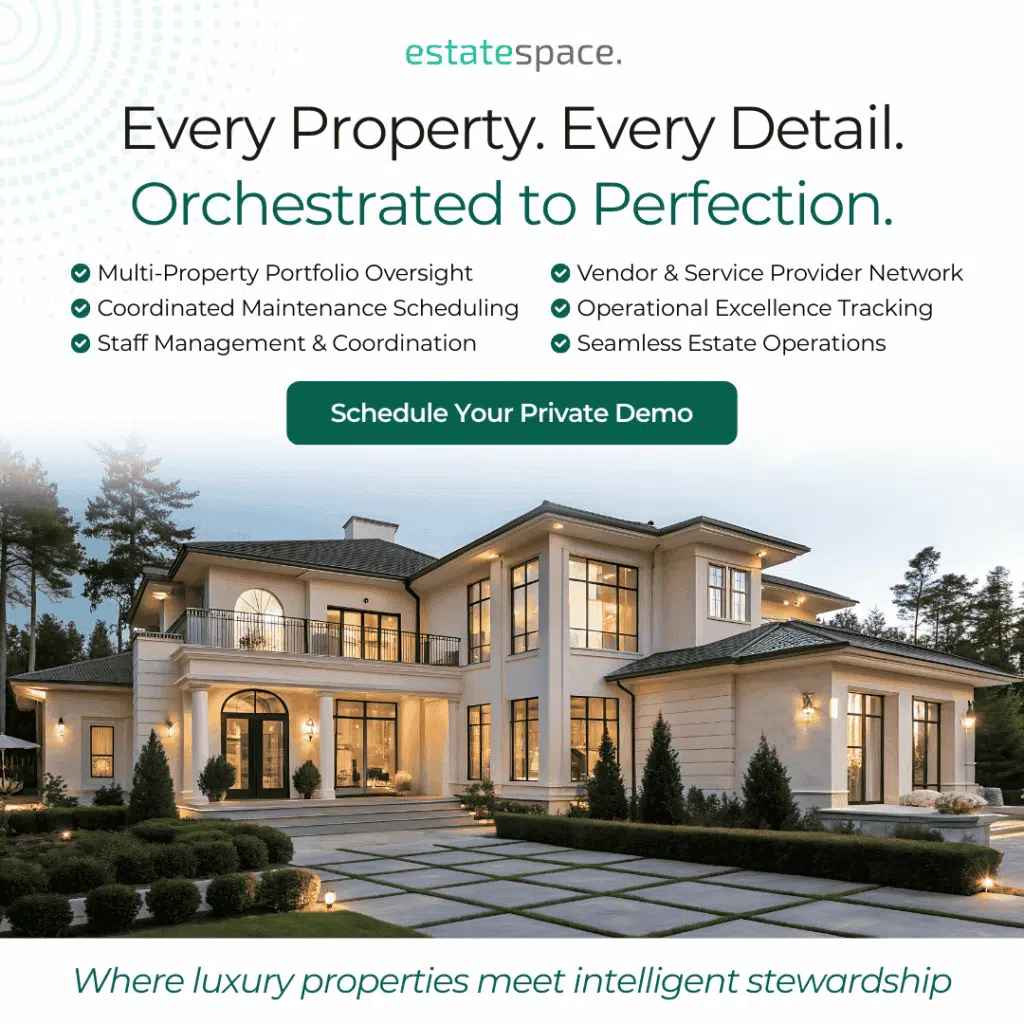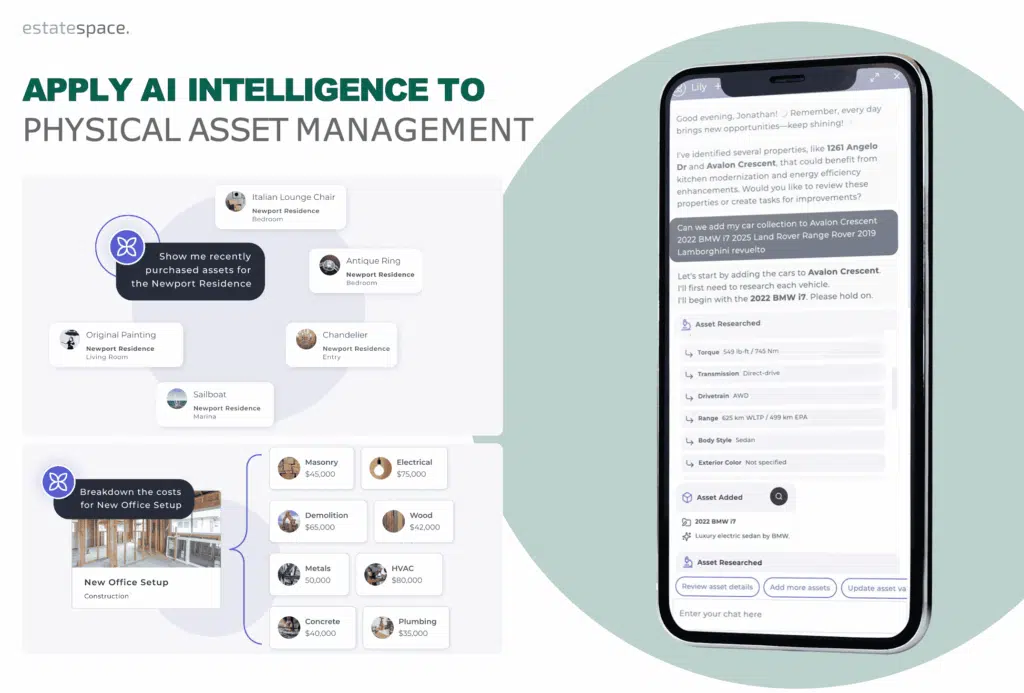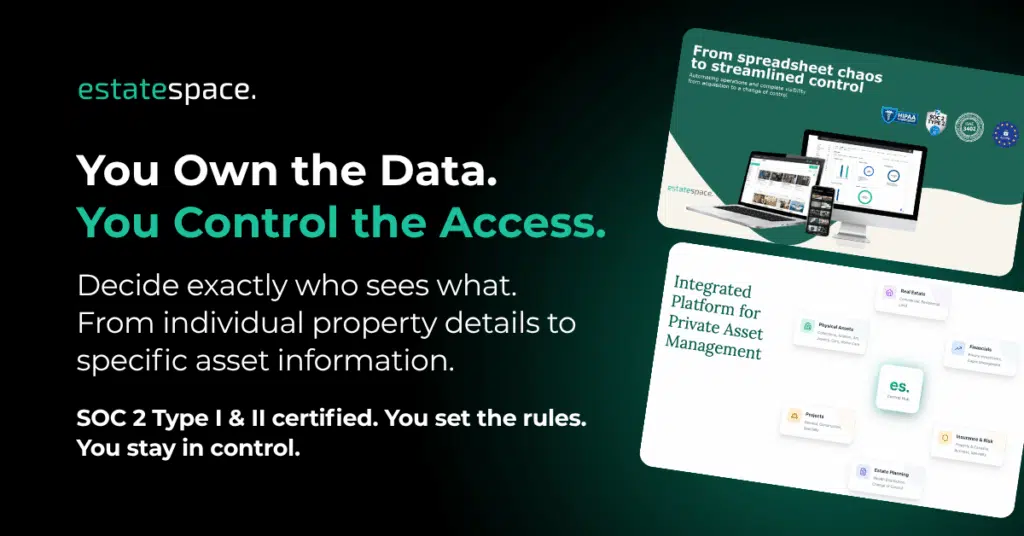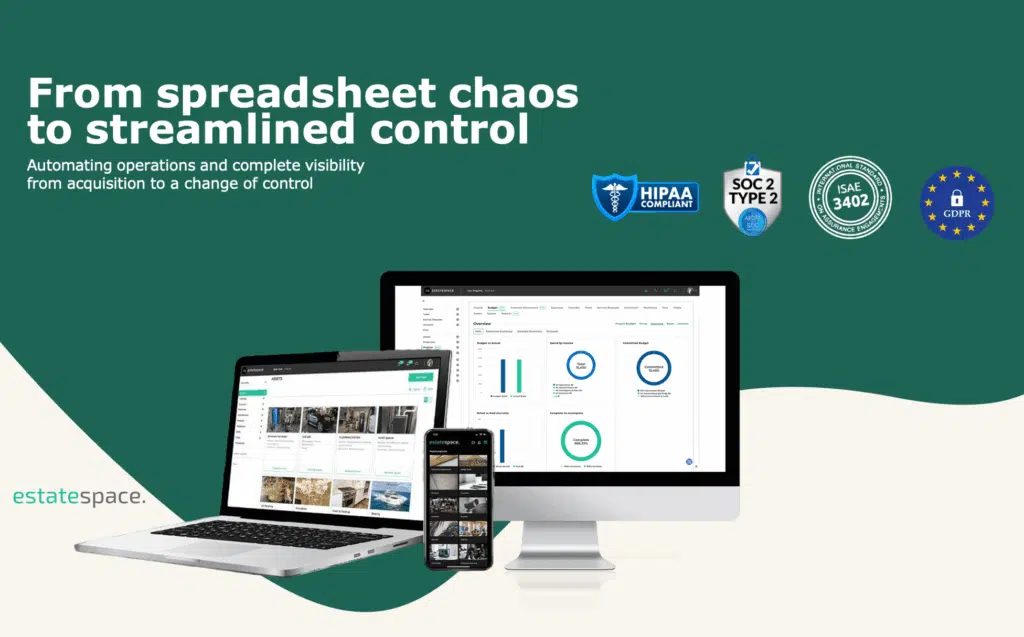House Management Software: Transform Estate Operations with AI-Powered Intelligence
You’re three properties deep when the call comes in. The HVAC at the Aspen house needs immediate attention, but you can’t remember which vendor serviced it last—or when. The maintenance log is somewhere in a spreadsheet. Or was it in that binder at the property? Maybe in the Dropbox folder the previous manager set up? This is exactly why professional house management software has become essential for modern estate operations.
This is your Tuesday.
By the time you track down the information, you’ve burned an hour that should have gone to strategic work. Meanwhile, your client wants to know why costs are up 18% this quarter, and you’re hunting through scattered files instead of having answers ready.
You didn’t get into estate management to be a data archaeologist. However, without the right house management software, that’s what the job becomes.
Why Estate Managers Need House Management Software
Here’s the reality nobody warned you about: 60% of your time goes to finding information, not managing properties.
You’re coordinating vendors across multiple locations. Additionally, you’re tracking maintenance schedules in your head because the spreadsheets don’t sync. Furthermore, you’re fielding calls about paint colors, warranty information, and service histories while trying to schedule preventive maintenance that keeps getting pushed because something urgent came up.
Again.
According to Harvard Business Review, institutional knowledge loss during transitions costs organizations far more than most realize. For estate managers, that means every time someone leaves—whether it’s you, another manager, or a long-term vendor—years of accumulated property knowledge walks out the door with them.
And your clients expect you to have it all figured out anyway.
The tools you’re using weren’t built for what you’re actually managing. Consumer-grade spreadsheets, binders that get outdated the moment you print them, Asana for tasks, Google Calendar for scheduling, Dropbox for files, email threads for vendor communication—you’re managing the tools instead of the properties.
Consequently, you need house management software that actually understands your job.
Core Capabilities of Professional Property Management Systems
Real estate management technology changes how you work in three fundamental ways:
It eliminates the information hunt. Every property detail, vendor contact, maintenance history, and expense record in one system. Therefore, when a client asks a question, you have the answer in seconds—not after an afternoon of detective work.
It builds your institutional knowledge automatically. Every task you complete, every vendor interaction, every issue you resolve gets captured and preserved. As a result, when you transition properties (or transition roles), nothing gets lost. The next manager inherits complete operational knowledge, not scattered fragments.
It does the administrative work instead of organizing it. This is where AI workflows transform your day.
AI-Powered House Management Software: How Automation Transforms Your Workflow
Traditional platforms ask you to enter data manually. Update spreadsheets. Create tasks. Set reminders. That’s not help—that’s more work disguised as organization.
In contrast, purpose-built house management software powered by AI actually eliminates the work:
- Upload a vendor invoice → AI extracts data, updates expenses, links to the property and asset
- Take a photo of equipment → AI creates the asset record with model numbers, specs, and maintenance schedule
- Drop a handoff spreadsheet from the previous manager → AI maps everything to the right properties and locations
- Add a new property to your portfolio → AI generates preventive maintenance schedules based on the equipment and systems
One estate manager told us: “I inherited three properties from a manager who retired. Took me eight months to figure out all the vendor relationships and maintenance schedules. With AI-powered estate management, that knowledge would have been there on day one.”
Complete Visibility Across Your Property Portfolio
Here’s what sets modern estate management platforms apart for managers: they’re built for how you actually work.
When You Take Over a Property: Complete property inventory already documented. Every system, every vendor relationship, every maintenance schedule preserved. Therefore, you can start managing effectively from day one, not month six.
In Daily Operations: One place for everything. Vendor contacts organized by property and specialty. Additionally, maintenance schedules that actually notify you before something becomes urgent. Expense tracking that makes month-end reporting simple instead of painful.
When Clients Ask Questions: Pull sophisticated reports in minutes showing exactly where costs are going, what maintenance has been completed, and how you’re protecting property values. Consequently, you deliver the kind of reporting that justifies your fees and wins you additional properties to manage.
For Your Own Growth: The estate management playbook becomes your system, not something stuck in your head. As a result, you can scale from managing three properties to ten without proportionally increasing your administrative burden.
This matters for asset managers building professional practices: your ability to take on more properties without burning out depends on having systems that scale.
From Reactive Firefighting to Proactive Property Management
Right now, you’re probably reactive. Something breaks, you fix it. A client calls, you scramble. An invoice arrives, you try to remember what it’s for.
However, with proper house management software, you shift to proactive:
Morning Dashboard Shows You:
- Three maintenance items coming due this week across your portfolio
- Two vendor invoices waiting for review
- One client service request that needs scheduling
- Property inspection checklists ready for the quarterly walkthroughs
During Property Visits: Pull up complete property details on your phone. Furthermore, log issues immediately with photos. Create tasks for follow-up work. Check maintenance history before calling vendors. Everything documented in real-time, nothing forgotten in your notes later.
Month-End Reporting: Generate comprehensive expense reports by property, by category, by vendor. Additionally, show year-over-year comparisons. Demonstrate proactive maintenance that prevented bigger issues. All in about fifteen minutes instead of three days.
When Clients Ask “Why Did This Cost So Much?”: Show complete history: previous repairs, maintenance intervals, vendor performance. Therefore, you can turn defensive conversations into demonstrations of sophisticated management.
This is what estate operations management looks like when you have the right tools.
Enterprise Security Features in Modern House Management Software
You’re managing sensitive information about high-value properties and affluent families. Consequently, using consumer-grade tools puts both you and your clients at risk.
Purpose-built house management software includes enterprise-level security (SOC 2, HIPAA, GDPR) and granular permission controls:
- Clients see property information and can submit service requests
- You see full operational details across all properties
- Housekeepers see only their task lists
- Vendors see only what’s relevant to their specific work
- Office staff see what you determine they need
When a vendor relationship ends or a staff member leaves, revoke access immediately. As a result, you don’t have to worry about information walking out the door on someone’s personal phone.
Property Management Software for Construction and Operations
If you’re managing construction projects, you know the frustration: relationships often end when you hand over keys. However, with house management software that bridges construction to operations, you can:
During Construction: Track budgets, manage contractors, document everything as you build. Purpose-built project management capabilities that handle residential complexity (CSI codes, RFIs, submittals, client selections).
At Project Completion: Transition everything into operations mode with one click. Therefore, all your construction documentation becomes the foundation for decades of property management. Vendor relationships, equipment specs, warranty information—nothing gets lost in handoff.
Ongoing Relationship: Offer continued management or oversight. Turn one-time projects into long-term client relationships. Consequently, you can manage multiple properties for the same client efficiently.
The construction data doesn’t disappear. Instead, it becomes institutional knowledge that serves the property for its entire lifecycle.
How House Management Software Improves Client Relationships
An estate manager handling four properties told us: “I was spending entire afternoons just preparing for monthly client calls. Now I generate reports in minutes and spend my time on actual strategy instead of data gathering.”
Similarly, a property manager with 60+ properties in his portfolio shared: “The visibility changed everything. I identified patterns showing we were spending $150,000 annually on reactive repairs that proper preventive maintenance would eliminate. That conversation alone justified my management fees for the year.”
A house manager said: “When the principal asks about anything—paint colors, service history, vendor performance—I have answers immediately. It completely changed how they see my value.”
This is estate ecosystem management when technology actually supports your expertise instead of fighting it.
ROI: What Estate Management Software Delivers
Let’s be direct about what house management software delivers to you as a professional:
Time: Eliminate 60% of administrative work. Therefore, you can spend your day managing properties, not managing information. Additionally, you can take on more properties without working more hours.
Professional Knowledge: Build a documented track record of your expertise. Consequently, every property you manage becomes a portfolio piece showing sophisticated operations. Your institutional knowledge has value even when you move to new properties.
Client Confidence: Deliver sophisticated reporting and proactive management that justifies premium fees. As a result, you can win additional properties from clients who see the difference between your approach and their previous manager’s.
Risk Reduction: Preventive maintenance scheduling catches issues before they become expensive emergencies that make you look reactive. Furthermore, documented processes protect you if something goes wrong.
Scalability: Grow from managing a few properties to a full portfolio without proportionally increasing your workload or stress level.
One manager calculated that proper systems allowed him to take on three additional properties without hiring help—adding $120,000 to annual revenue with minimal additional costs.
Implementing Modern House Management Software: Your Timeline
The concern every manager has: “I don’t have time to implement new software.”
However, with AI-powered house management software, implementation fits into your existing workflow:
During the first week: Configure your current properties and set up team permissions (2-3 hours total)
In weeks two and three: Upload existing documentation—AI handles the heavy lifting of organizing and mapping everything (drop files as you have them, no dedicated time blocks needed)
By week four: Train any team members on their specific workflows (housekeepers, maintenance staff, office support)
Through weeks five and six: Transition to full operational mode with complete property visibility
Not six months. Not even three months. Six weeks from scattered information to complete control.
Moreover, you get a dedicated account manager who knows estate operations supporting you through every step.
Purpose-Built vs. Generic Property Management Tools
You could keep cobbling together multiple tools. Many managers do—it’s what we did for 16 years before building EstateSpace.
We managed complex estates professionally. Therefore, we lived every frustration you’re experiencing: the spreadsheet chaos, the knowledge loss during transitions, the administrative burden that consumed time that should have gone to strategic work.
We built house management software because we couldn’t find anything that actually worked for what we were managing. Property management tools designed for apartment complexes didn’t fit. Project management platforms built for commercial construction missed the mark. Consumer apps trying to serve professional needs fell short.
Purpose-built means understanding that you’re managing million-dollar HVAC systems, not home thermostats. That your vendor relationships matter. That your institutional knowledge has real value. That you need enterprise security, not consumer convenience.
House manager software that actually understands your role changes how you work—and how your clients see your value.
Transform Your Estate Management Practice
Your properties are too valuable, your operations too complex, and your time too limited to keep managing everything with inadequate tools.
You became an estate manager to manage properties professionally, not to be an administrative coordinator hunting through scattered files.
The right house management software doesn’t just organize your chaos—it eliminates it. Additionally, it doesn’t just track your work—it amplifies your expertise. Furthermore, it doesn’t just help you manage—it positions you as the strategic professional you are.
See how EstateSpace transforms estate operations with AI-powered intelligence built specifically for professional property managers. Complete visibility. Total control. Built by estate managers who understand exactly what you’re managing—because we managed it first.
EstateSpace is purpose-built house management software designed for estate managers, property managers, and house managers managing complex portfolios. Powered by AI workflows that eliminate administrative burden and build institutional knowledge that makes you irreplaceable to your clients.







